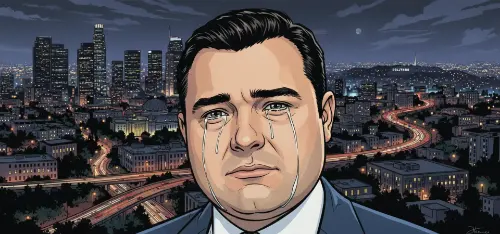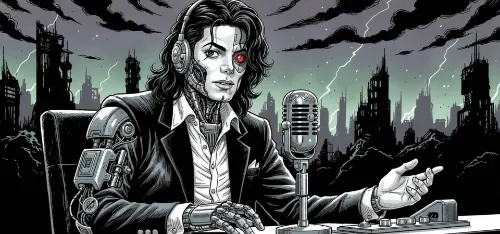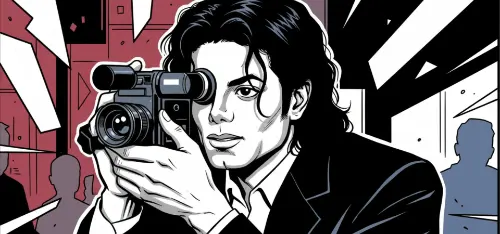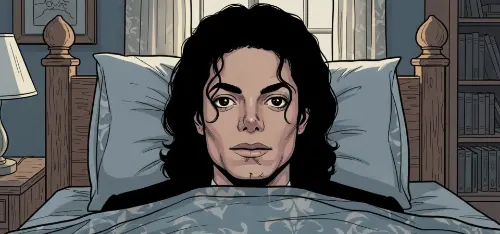Understanding the 2005 "Not Guilty" Verdict

March 25, 2025
If you question Michael Jackson’s innocence online, it’s almost guaranteed someone will respond by saying he went through a long and thorough trial and was found not guilty on all counts—proof, they claim, of his complete innocence. This line is repeated often, almost like a mantra, especially by hard-core defenders.
For example, just before the release of the documentary Leaving Neverland, the Jackson Estate issued a statement declaring:
Michael Jackson is innocent. Period. In 2005, Michael Jackson was subjected to a trial—where rules of evidence and law were applied before a neutral judge and jury and where both sides were heard—and he was exonerated by a sophisticated jury. Ten years after his passing, there are still those out to profit from his enormous worldwide success and take advantage of his eccentricities. Michael is an easy target because he is not here to defend himself, and the law does not protect the deceased from defamation, no matter how extreme the lies are. Michael may not have lived his life according to society's norms, but genius and eccentricity are not crimes.
Yet it is important to emphasise that a verdict of “not guilty” is not equivalent to a declaration of innocence. In 2005, Jackson was acquitted of charges relating to Gavin Arvizo because the evidence failed to convince the jury beyond reasonable doubt. That outcome does not erase concerns about his behaviour, nor does it silence other allegations made against him.
Every trial centres on specific charges, with a defendant and a plaintiff. In this case, Jackson was the defendant and Gavin Arvizo the plaintiff. The proceedings focused solely on the accusations brought by Gavin and his family, not on any other claims.
Evidence of earlier allegations—such as those involving Jordan Chandler in 1993 and Jason Francia in the mid-1990s—was permitted in the 2005 trial to provide context about Jackson’s conduct with children. However, this evidence was either restricted or ruled inadmissible when it came to the final verdict. Under California law, judges must weigh whether such evidence is more useful than prejudicial. This principle ensures that a defendant is judged only on the charges at hand, rather than being unfairly influenced by past accusations.
Jurors admitted feeling uneasy about Jackson’s close relationships with children, and some suspected troubling behaviour in his past. Nevertheless, the judge’s instructions made clear that they could not take earlier allegations into account when deciding the 2005 case.
From the document:
2.50 EVIDENCE OF OTHER CRIMES
(EVIDENCE CODE § 1101)
Evidence has been introduced for the purpose of showing that the defendant committed crimes other than that for which he is on trial.
Except as you will otherwise be instructed, this evidence, if believed, may be considered by you only for the limited purpose of determining if it tends to show:
- A characteristic method, plan or scheme in the commission of criminal acts similar to the method, plan or scheme used in the commission of the offense in this case which would further tend to show the existence of the intent which is a necessary element of the crime charged;
- The existence of the intent which is a necessary element of the crime charged;
- A motive for the commission of the crime charged;
- For the limited purpose for which you may consider such evidence, you must weigh it in the same manner as you do all other evidence in the case.
2.50.01 EVIDENCE OF OTHER SEXUAL OFFENSES (Evidence Code § 1108)
Evidence has been introduced for the purpose of showing that the defendant engaged in a sexual offense on one or more occasions other than that charged in the case.
- "Sexual offense" means a crime under the laws of a state or of the United States that involves:
- Any conduct made criminal by Penal Code § 288a. The elements of this crime is set forth elsewhere in these instructions.
- If you find that the defendant committed a prior sexual offense, you may, but are not required to, infer that the defendant had a disposition to commit sexual offenses. If you find that the defendant had this disposition, you may, but are not required to, infer that he was likely to commit and did commit the crime or crimes of which he is accused.
- However, if you find by a preponderance of the evidence that the defendant committed a prior sexual offense, or offenses, that is not sufficient by itself to prove beyond a reasonable doubt that he committed the charged crimes. If you determine an inference properly can be drawn from this evidence, this inference is simply one item for you to consider, along with all other evidence, in determining whether the defendant has been proved guilty beyond a reasonable doubt of the charged crime.
Jurors were required to base their verdict solely on the evidence relating to Gavin Arvizo. They could not allow their personal views or suspicions about earlier allegations to influence their decision.
Some members of the jury, which acquitted "The King of Pop" of all 10 charges related to allegations that he molested a now-15-year-old boy, said they suspected the singer had molested other children but that prosecutors had not proven he had done anything illegal to the accuser in his trial.
During deliberations, jury foreman Paul Rodriguez said, he and other jurors frequently discussed the testimony they had heard about past allegations that Jackson had molested or behaved inappropriately with five other boys, including two youngsters who reached multimillion-dollar settlements with the singer in the 1990s.
But, Rodriguez said, the jurors knew they could not convict solely on the basis of past allegations.
This is further confirmed in another interview conducted after the trial.
When asked if they believed that Michael Jackson may have molested other children, however, three jurors said they suspected that could be true. The jury heard testimony from a number of sources about Jackson's alleged molestation or inappropriate behavior with other children.
But the jurors said they closely followed the judge's instructions, considering only the evidence presented in this case.
The jury foreman, Paul Rodriguez, said past allegations came up frequently in the jury room, and while he said it is "possible" Jackson could have molested other children," we couldn't weigh that with this case in particular.
Paul Rodriguez Further added:
The jury foreman, Paul Rodriguez, said jurors were "very troubled" that Jackson, by his own admission, had overnight sleepovers with children in his bed.
But Rodriguez, a 63-year-old retired high school counsellor from Santa Maria, said jurors were instructed by the judge to base their verdicts on the facts of the case, not "our beliefs or our own personal thoughts."
"We would hope ... that he doesn't sleep with children anymore," Rodriguez said on CNN. "He just has to be careful how he conducts himself around children."
Another Juror, Raymond Hultman, clarified this in the 2005 documentary Why Michael Jackson Won.
Being found “not guilty” in court does not automatically mean a person is innocent of similar crimes committed against others. It is not unusual for someone to be acquitted in one case but later convicted of the same offence in another.
For instance, Argentine musician Cristian Aldana was cleared in two child sexual abuse cases but later found guilty in four others. Likewise, Gary Glitter was acquitted of allegations involving a girl in the 1970s, yet in 2015 he was imprisoned for committing the same crime against another victim.
In Michael Jackson’s situation, the allegations made by Jordan, Wade, James, and Jason are separate from those brought by Gavin Arvizo. These should be treated as distinct cases and not confused or merged together.
Is It Accurate to Assert That Michael Jackson Is Innocent of Sexually Abusing Gavin Arvizo?
No, not at all. In the American judicial system, a verdict of not guilty does not mean the person has been proven completely innocent.
In court, the defence is not required to “prove innocence.” Instead, the responsibility lies with the prosecution to prove guilt. In criminal trials, the jury must weigh both sides carefully and decide whether the prosecution has proved its case beyond reasonable doubt.
A verdict of not guilty does not mean the jury unanimously believed the defendant could not possibly have committed the crime. Rather, it means the jury considered the evidence and concluded it was insufficient to convict.
In Michael Jackson’s trial, the jury was deeply divided, which created significant tension. Some jurors believed he was guilty, others believed he was innocent, and some chose not to make their views public. In the end, they all voted not guilty to avoid a hung jury—a situation where no unanimous decision can be reached.
So, can it be argued that nothing was proven? Legally, yes. The trial took place, and the jury delivered its verdict according to the high standard of proof required in criminal law. Factually, however, the matter is less clear. Expecting absolute proof in a sexual abuse case is unrealistic. Jackson’s lawyer, Thomas Mesereau, handled the trial more effectively than prosecutor Tom Sneddon, and the family’s poor reputation weakened their case. Yet this does not rule out the possibility that abuse occurred.
Sexual abuse trials are notoriously difficult to win. They often lack physical evidence, victims may struggle to give consistent accounts, and jurors—who are not experts in the subject—must make decisions in an area that is complex and emotionally charged.
Child sexual abuse (CSA) cases are notoriously difficult to prosecute. Medical evidence is available in less than 5% of the reported cases of CSA and the prosecution often must rely on the testimony of a child. Prosecutors have the responsibility to achieve justice. They balance this role with the complexities of determining what is justice for the child victim and how can they best protect the community from offenders who may go on to sexually abuse others. In 2014, the National Institute of Justice (NIJ) funded this study of prosecution of CSA. This report describes research findings on prosecutorial outcomes and considers obstacles to obtaining justice for the child victims in these complicated cases.
We conducted retrospective analysis of 500 CSA cases referred for prosecution in one state, to examine the barriers to prosecuting these cases. We analysed case records for evidence about the alleged incident, details about the victim, the victim’s family, the alleged perpetrator, and the prosecutorial decisions. We assessed the case attrition and the CSA case characteristics associated with prosecution outcomes.
And:
The decision to prosecute child sexual abuse is a complicated process in part because of the special dynamics surrounding child abuse: The crime of sexual abuse is often committed in private; there are rarely eyewitnesses; and the child’s testimony usually provides most of the information about the crime. When children are young, the quality of their testimony may be compromised by developmental limitations in memory and language. Furthermore, there are potential complications to sexual abuse cases: The child may have a pre-existing close relationship with the offender, thereby increasing the chance of reluctant cooperation in the court process. In addition, the criminal court process can be extremely lengthy for sexual abuse cases, and caregivers may be concerned about the stress placed onto their children as a result of the process.
And:
It is exceedingly difficult to make child sexual abuse cases stick at trial, according to prosecutors, police and advocates, because months may have passed before the abuse came to light, child witnesses may waver and there seldom is the additional physical evidence jurors crave.
'It's the No. 1 hardest crime to prosecute,' said Cedar Rapids police Officer Charity Hansel, who investigated sex and internet crimes against children for 11 years.
Was It a Squeakyclean Trial?
I doubt there are many trials where every witness, whether for the prosecution or the defence, tells the whole truth. The 2005 trial was no exception.
One of the most striking examples was Wade Robson, hailed at the time as the defence’s “star” witness. In court, Wade denied any wrongdoing by Jackson. Yet years later, in 2013, he revealed that he had in fact been abused more than a hundred times as a child, a secret he kept hidden due to years of grooming and manipulation.
Wade’s testimony was not the only misleading account. His mother, Joy, and sister, Chantelle, also spoke in Jackson’s favour, unaware of the dark truth Wade was concealing.
His statements had wider consequences too. Some witnesses were unfairly discredited because of Wade’s denial. For example, Blanca Francia, a former housemaid, testified that she believed she had seen Wade showering with Jackson. During the trial, Wade flatly denied ever having used the shower with him, only to admit during his 2013 disclosure that this was in fact a lie.
There were also witnesses who shifted their positions entirely. At least two individuals who had initially intended to testify against Jackson ended up praising him instead. Ron Zonen, one of the lead prosecutors, highlighted this in the 2020 documentary The Real Michael Jackson. He suggested that Jackson may have influenced these witnesses, pointing to his ex-wife Debbie Rowe and possibly his former manager, Bob Jones.
Watch the clip below.
Thomas Mesereau also drew criticism for his tactics. At one point, he misled Gavin Arvizo’s brother, Star, to identify a copy of Barely Legal magazine as the same one Jackson had shown him and Gavin. In reality, the magazine Mesereau produced had been published at a later date, making Star appear dishonest. It is worth noting that issues of Barely Legal look very similar to one another, which made the trick easier to pull off.
Another example involved prosecution witness Kiki Fournier, a former housemaid. She was asked about the boys she had seen visiting Neverland Ranch, including James Safechuck. Mesereau then pressed her on whether she knew Safechuck had married at Neverland. Fournier replied that she didn’t even know he was married. The problem is that Safechuck never married at Neverland at all. By raising the question, Mesereau created the impression for the jury that Safechuck had maintained a close, positive relationship with Jackson into adulthood—something that was simply untrue.
Jackson himself also became part of the courtroom drama. On 10 March, he arrived an hour late, dressed in pyjamas, looking frail and in pain. This appearance coincided with key testimony from Gavin Arvizo and his family. Mesereau initially explained the delay by claiming Jackson was in hospital with a severe back injury after tripping while getting dressed. Yet only weeks later, Jackson gave a different account, saying he had slipped in the shower and badly bruised his lung, which required treatment.
Sounds convincing enough—until you look closer. In the 2017 documentary TIME Presents: Celebrities on Trial, Mesereau repeated his original claim that Jackson had fallen and hurt his back, directly contradicting the later “shower incident” story.
Watch the clip below.
So why couldn’t Jackson and Mesereau keep their story straight?
It appears clear that Jackson staged an injury to make himself look frail and vulnerable. This was not the first time he had tried such tactics—remember, he had previously accused officers of dislocating his shoulder during his 2003 arrest, a claim that proved false. By arriving late in court dressed in pyjamas, he drew intense media and public attention, a move that likely disrupted the Arvizo family’s testimony.
Whether these actions significantly influenced the jury’s final verdict is something we will never know. What is certain, however, is that they played a role in shaping the atmosphere of the trial.
With permission, the following article was translated and enhanced from The Truth about Michael Jackson, with further details added by myself.





